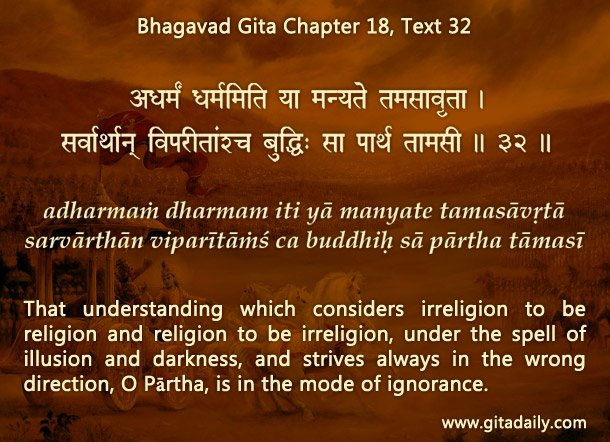Just because a decision is regrettable doesn’t mean that it will be regretted.
Our life is filled with decisions—some small, some big, some good, some bad, some recognized as bad, and some not recognized as bad. During the course of our life, and especially the course of our growth through life, we need to be able to look at our decisions objectively so that we can learn from them consistently.
That means each one of us needs to be able to have a certain level of dispassion or non-attachment when we look at the choices that we made, the considerations that went into making those choices, and the consequences that played out after those choices. The Bhagavad Gita 18.30 declares that intelligence in the mode of goodness contemplates the various relevant factors involved in choosing a judicious course of action.
As contrasted with such decision-making in the mode of goodness, the same Gita, two verses later in 18.32, cautions that some people misjudge what is desirable, what is healthy, what is passionate, and indeed their conclusions are the opposite of what they should be. They conclude bad decisions as good ones and vice versa.
Such a mismatch in assessment and reality can occur when a decision is regrettable in the sense that not only does it have objectively terrible consequences, but it is also proclaimed to be terrible by objective observers. Yet, the person making that decision remains rigid in rationalizing it, defying their own reasoning process.
Thus, a decision itself may be regrettable, but it is not regretted by them. This is the path to self-created deception that spirals into self-propelled destruction. This indeed is the trajectory Duryodhana takes in the Mahabharata. He never regrets many of his cunning machinations against the Pandavas, which finally result in a devastating fratricidal war that costs not only his life but also the lives of all his hundred brothers, and indeed a major section of the Kuru dynasty into which he was born.
Summary:
- To make judicious decisions, we need to objectively observe the choices we made, the considerations contemplated before making the choices, and the consequences that have played out after those choices.
- Instead, if we choose not to regret decisions that are objectively regrettable but choose to rationalize those decisions, we go down the path of self-deception that ends in self-destruction.
- Life’s trajectory can be shaped by the ramifications of decisions that are regrettable but are not regretted.
Think It Over:
- To grow in life, how do we need to look at our decision-making?
- What is the unhealthy approach to decision-making?
- Contemplate one area in which you could review your decision-making.
***
18.32 That understanding which considers irreligion to be religion and religion to be irreligion, under the spell of illusion and darkness, and strives always in the wrong direction, O Pārtha, is in the mode of ignorance.



Leave A Comment